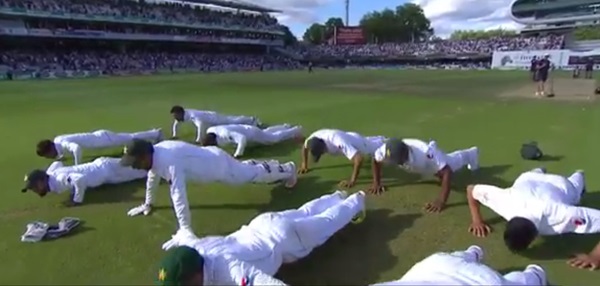
For all the good cricket Pakistan played to beat England at Lord’s, their greatest attribute was that they visibly enjoyed playing Test cricket. Throughout the match, they were like a group of 11 children revelling in some sort of collective birthday, and when they won, it seemed they’d received the greatest present ever.
Unusual victory celebrations can go one of two ways. They can seem mannered and choreographed and a little self satisfied, or they can come across as a symptom of group giddiness. Pakistan’s press-ups seemed like the latter; like just a minor thing; something that arose as a result of broader positive qualities.
A brilliant finish to a brilliant test! A victorious Pakistan team show they’ve still got plenty left in the tank! https://t.co/M1VyaEWRb7
— Sky Sports Cricket (@SkyCricket) July 17, 2016
Regardless of the result, this was a fun Test match.
That’s right, fun.
You know, like sport’s supposed to be.


Love this Pakistan side already. England were outplayed by a better team overall.
Bring back Ian Bell.
One of these opinions may or may not be controversial.
If only one of these options may or may not be controversial, doesn’t that imply that the other can be neither controversial or non-controversial? And given that controversial and non-controversial cover the entirety of possibilities, doesn’t it further imply that one of these statements can’t exist?
But which one? Which of the two clearly extant statements doesn’t exist? There’s never a logical positivist around when you need one.
It was a really good game of cricket and Pakistan indeed deserved to win.
I’m not convinced that Pakistan are the better team but they played better than England over the four days at Lord’s. Things might be different at Old Trafford, Edgbaston and/or The Oval.
To answer Bert’s “hit the ball twice” question on the previous thread, the batsman in your scenario would not be out, because the ball hit the ground between the first hit and the second hit. Law 32 section 3 defines a fair catches in various circumstances, including this subsection for the circumstance described:
“(c) a fielder catches the ball after it has been lawfully struck more than once by the striker, but only if it has not been grounded since it was first struck.”
I DO get out more – cripes I was at the test match Thursday, Friday and Sunday…what more do you want?
Saturday, Ged, that’s what.
Seconded. Saturday.
Why on earth didn’t you go on Saturday?
Don’t answer that. It’s a rhetorical question because no answer could ever be acceptable.
I’ve let myself down, I’ve let the England team down, but most of all I have let the KC-readership down.
I’m sorry; what more can I say?
Thanks Ged. And never mind these nay-sayers – spending your Saturday researching the Laws of Cricket is a very profitable way to spend your time.
I tried a bit of research on the matter of hitting the ball twice before asking here, but I was unable to find the answer. What I did find, however, was quite interesting. Let me give you a flavour:
Apparently, the double-hit law and the obstructing the field law were introduced specifically to reduce the casualty rate. But is this really an improvement? Imagine – a batsmen skies an attempted six and then has to sprint to get to the fielder before the ball comes down, walloping him in the teeth if he gets there in time. I’d start watching the IPL if it were like this.
Totally agree, Bert. A little bit of ultraviolence in the cricket never did anyone any harm…
…apart from the bloke who got brained by the batsman while trying to take a catch, obviously. Collateral damage.
If ever a photo was ripe for a hover caption ….
Yeh, why is there no hover caption, KC?
Don’t answer that. It’s a rhetorical question because no answer could ever be acceptable.
Why didn’t the England batsmen just dig in and get the runs from a defensive stance literally and figuratively?
Have sounding a smidgeon like Boycs but they can’t seem to occupy the crease anymore.
Hales, Root, Vince and Ali played poor shots of KP destructive quality and Bairstow made a poor decision against a ball never short enough to pull.
Of course, it’s easy to make such criticisms from my keyboard warrior position and the Pakistanis bowled really well.
Ultimately, glad that it looks like a competitive series as opposed to another Test where we put opponents from sunnier climbs into the cold-house environments north of Watford Gap and let Anderson and Broad turn their arms over to take wickets almost at will.
Would almost like to go down the road to OT and watch the next one but I refuse to pay the £100 or similar to do so. Should I get an Amigo loan maybe?
Will end up listening to TMS again and will hope they get Judy Murray on again as she is wonderful.
In this new world of freedom, positivity and no-consequence batting, has the concept of “you can’t play that sort of shot” become redundant?
Try telling that to P. Morgan
https://twitter.com/piersmorgan/status/754677427771678720